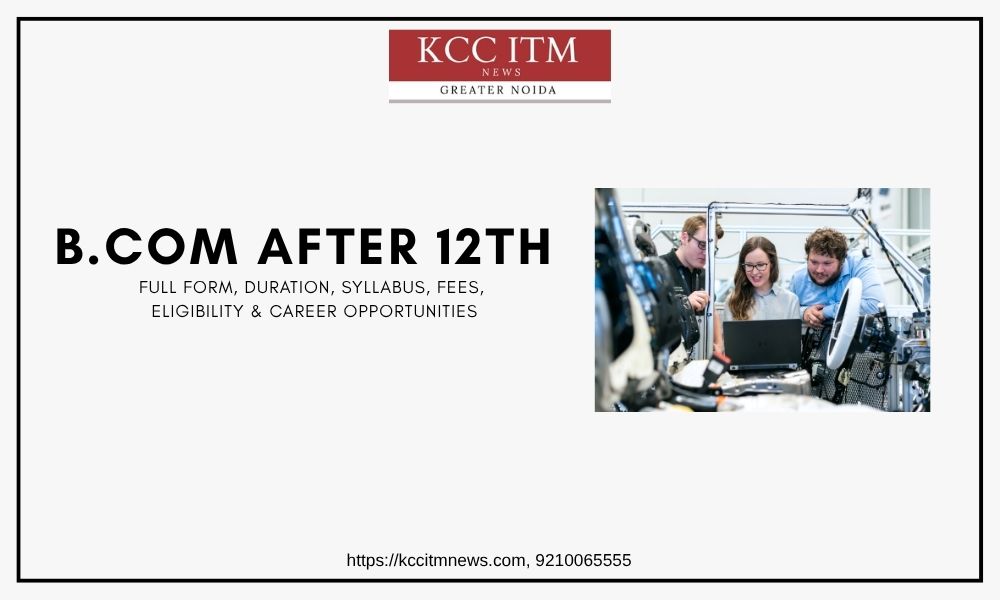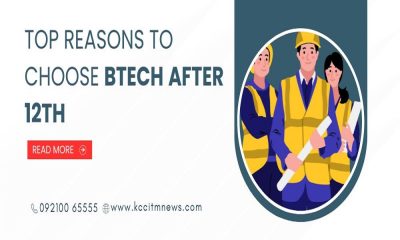b com
B.Com after 12th

B.Com after 12th: Full Form, Duration, Syllabus, Fees, Eligibility & Career Opportunities
The three-year undergraduate Bachelor of Commerce (B Com) program focuses on business management, accounting, taxation, finance, and economics. For students aspiring to pursue jobs in business, finance, or administration, it is among the most sought-after degrees. Students graduate with a solid basis for future professional studies like CA, CS, CMA, MBA, or M Com, thanks to the course’s analytical, managerial, and communication abilities.
Usually lasting three academic years, the B.Com study is broken up into six semesters. Every semester includes electives, core subjects, and practical sessions. To increase job preparation and expose students to the industry, some colleges also provide internships or project work during the last semester.
Students must have finished Class 12 or its equivalent from an approved board to be eligible for a B.Com. Although students from the Commerce stream are most equipped for the course, many universities also admit students with backgrounds in the arts or sciences, depending on their admissions rules.
In general, most institutions give preference in admission to students who score above 75% in their 12th class, while some colleges would settle for 45-50%. This percentage can change from college to college.
B.Com Full Form
The full form of a B.Com is a Bachelor of Commerce. This undergraduate degree is awarded to students who complete a three-year program in business administration, finance, or commerce. Nearly all Indian universities offer the B.Com, a basic degree that supports a variety of career pathways.
Although “B.Com” is the basic title, it can take on several forms according to the institution or area of expertise. These consist of B.Com LLB (Integrated Law and Commerce), B.Com (General), and B.Com (Hons). The diversity shows how the training can be tailored to the student’s professional objectives.
B.Com Course Types
Let’s examine the most well-liked B.Com program categories offered in India:
General B.Com
The most popular B.Com form is this one. It addresses many topics, such as accounting, company law, auditing, taxation, and economics. For students who wish to broaden their knowledge of trade and maintain flexibility in their job choices, it’s perfect.
B.Com Honours
Students can concentrate on a particular area, such as accounting, finance, or economics, with B.Com Honours, a more focused and intensive version of the main course. Because of its more comprehensive and research-focused curriculum, this course is chosen by students who plan to pursue professional courses or postgraduate studies.
B.Com LLB
This comprehensive course blends legal studies with the foundations of trade. This five-year program is perfect for those who want to work in corporate law or legal consultancy. It creates job opportunities in judicial services, compliance divisions, and law firms.
Your interests, professional aspirations, and academic prowess will determine which of these sorts is best for you. Each has advantages of its own.
B.Com Course Details
The three-year undergraduate Bachelor of Commerce (B.Com) degree emphasizes accounting, finance, commerce, and business principles. Students are prepared for jobs in the corporate, banking, finance, and tax industries. The course gives students the academic and practical information they need to improve their managerial, entrepreneurial, and analytical abilities.
B.Com Course Overview
| Parameter | Details |
| Full Form | Bachelor of Commerce |
| Course Level | Undergraduate (UG) |
| Duration | Five years for integrated programs (like B.Com LLB) and three years (6 semesters) |
| Eligibility | 10+2 from an accredited school, ideally in commerce; at least 50% |
| Age Limit | There is no set age limit; it depends on the institution. |
| Admission Process | Entrance-based or merit-based (e.g., Christ University ET, SET, NPAT) |
| Major Specializations | Economics, Taxation, Banking & Insurance, and Accounting & Finance |
| Top Subjects | Economics, Taxation, Business Law, Cost Accounting, and Financial Accounting |
| Fee Range | Private: ₹50K–₹2L/year, Distance/Online: ₹6K–₹30K/year, Government: ₹5K–₹25K/year |
| Learning Mode | Online, Regular, and Distance |
| Popular Job Roles | Bank Officer, Auditor, Tax Consultant, Financial Analyst, and Accountant |
| Average Salary | Entry Level: ₹2.5 LPA to ₹6 LPA |
| Further Study Options | CFA, LLB, MBA, M.Com, CS, CMA, and CA |
| Competitive Exams | IBPS PO/Clerk, UPSC, SSC CGL, RBI Grade B, and CAT |
| Key Skills Developed | Analytical abilities, communication, business acumen, and financial literacy |
| Best For | Jobs in government services, banking, taxation, accounting, and finance |
B.Com Duration
The three-year B.Com program is broken up into six semesters. After class 12, B.Com is a popular choice for students studying commerce because it provides a variety of job choices in the areas of finance, banking, and accounting.
Why Take a B.Com Course?
• After earning a B.Com, students can look for jobs in banking and finance. After earning a B.Com, many students go into sales and marketing. Experience opens up a world of opportunities in the sales department across all industries. There is also a lot of opportunity for students who wish to remain with the finance or commerce route.
• By 2025, the Fintech market in India is expected to grow to a value of INR 6.2 trillion, offering a range of prospects for individuals working in the financial industry. Mutual funds and insurance, in addition to the growing Fintech industry, offer a variety of financial alternatives.
• India’s financial sector is tightly controlled by the banking industry. In India, banks own USD 2.4 trillion in total assets. Indian residents will be able to access all of these assets through bank credit. To run them effectively, banks require individuals with backgrounds in trade. USD 2.06 trillion was deposited in banks, and USD 1487 billion was given as credit in FY21.
B.Com Eligibility
Depending on the university and the nation, different requirements may apply for a Bachelor of Commerce (B.Com) degree. Nonetheless, the following are the general requirements:
• Academic Requirement: 10+2 with at least 45–50% (depending on the university) from an accredited board. Economics, mathematics, or commerce may be required courses at some schools.
• Age Limit: Most institutions don’t have a set upper age limit.
• Admission Procedure: Determined by entrance tests (such as CUET, NPAT, or SET) or merit (Class 12 grades).
• Relaxation: In accordance with government regulations, reserved categories may have reduced cut-off requirements.
B.Com Admissions Procedure
While each college may have a different admissions procedure, most B.Com courses include the following steps:
• Application Process: The majority of universities have an online application process in which you must submit your information, attach the required files, and pay a fee.
• Entrance examinations: While some colleges may use merit-based admissions, others may administer entrance examinations for B.Com admissions.
• Merit-Based Admissions: Grades from the 12th grade are frequently used to determine admissions. Your chances of getting accepted into a prestigious college rise with higher grades.
Documents Required:
• Class 10- & 12-mark sheets
• Transfer Certificate
• Migration Certificate (for other boards)
• Passport-sized photos
• Identity proof (Aadhar/PAN)
B.Com Skills
Numerous talents that are useful in the workplace can be developed with the aid of a B.Com education.
• Financial Acumen: Includes budgeting, financial analysis, and financial statement comprehension.
• Analytical abilities: Data evaluation, financial report interpretation, and well-informed decision-making.
• Business knowledge: A thorough comprehension of economic issues, managerial concepts, and company procedures.
• Accounting proficiency: The ability to use accounting software, procedures, and principles with ease.
• Communication Skills: Proficient written and verbal communication is essential for presentations and business meetings.
• Problem Solving: In a corporate setting, problem-solving entails recognizing problems, weighing choices, and putting solutions into action.
• Legal Awareness: An understanding of corporate governance, rules, and company laws.
• Marketing insight: The ability to comprehend consumer behaviour, market research, and marketing tactics.
• IT and Software Skills: Expertise in information technology applications and business-related software.
• Teamwork and Leadership: managing teams, collaborating on tasks, and exercising leadership.
B.Com Subjects
The curriculum and subjects of the B.Com program are intended to give students a thorough understanding of a range of commerce-related topics.
• Financial Accounting
• Cost Accounting
• Management Accounting
• Business Law
• Economics
• Business Mathematics and Statistics
• Income Tax
• Auditing
• Corporate Law
• Marketing Management
• Financial Management
• Organisational Behaviour
• Human Resource Management
• International Business
• E-Commerce
• Business Communication
B.Com syllabus
Various universities may have various B.Com curricula. Nonetheless, this is the B.Com generalized syllabus.
Year 1
• Financial Accounting: Introduction to accounting principles and financial statement preparation
• Business Economics: Foundations of both macro and microeconomics.
• Business mathematics is the application of fundamental mathematics to business settings.
• Business Communication: Proficiency in business communication.
• Management principles: Fundamentals of effective management techniques.
Year 2
• Cost Accounting: Methods for costing and cost control.
• Corporate law: The body of legislation that regulates corporations.
• Marketing Management: Marketing concepts and tactics.
• Financial management: The process of overseeing a company’s financial assets.
• Business statistics: Methods and tools used to analyse business data.
Year 3
• Management Accounting: Advanced management accounting methods
• Auditing: Auditing principles and practices.
• Income Tax: Fundamentals of tax planning and income tax legislation.
• International business: The conduct of business on a worldwide scale.
• Human resource management: Managing people in organizations is known as human resource management.
B.Com Specialisation
| Specialisation | Focus Areas |
| Accounting and Finance | Auditing, financial accounting, financial management |
| Marketing | Consumer behaviour, marketing strategies, market research |
| Human Resource Management | Organisational behaviour, Recruitment, employee relations |
| International Business | Cross-border transactions, Global trade, international marketing |
| Banking and Insurance | Insurance policies, Banking operations, financial services |
| Economics | Economic analysis, Economic theory, policy |
| Taxation | Tax planning, Tax laws, Compliance |
| E-Commerce | Digital marketing, Online business operations, e-commerce strategies |
| Business Analytics | Tools for data analysis and statistics in corporate decision-making |
| Corporate Law | Corporate rules, corporate law, legal considerations in business |
| Entrepreneurship | Innovation, business planning |
B.Com Course Fees
Depending on whether the college is private or public, B.Com course prices can differ significantly.
| Institution Type | Average Annual Fees (INR) |
| Public Universities | ₹5,000 to ₹30,000 |
| Private Universities | ₹50,000 to ₹2,00,000 |
| Prestigious Institutions | ₹1,00,000 to ₹3,00,000 |
What are the B.Com entrance exams 2025?
The following lists the dates for the B.Com Entrance Exam registration and exam:
| Exam | Registration Dates | Exam Date |
| CUET | March 1 – March 22, 2025 | May 8 – June 1, 2025 (Tentative) |
| IPU CET | February 1 – March 31, 2025 | Last week of April 2025 – 2nd week of May 2025 |
| NPAT | February 20 – May 26, 2025 | March 1, 2025 to May 31, 2025 |
| AIMA UGAT | June 09, 2024 (Last Date) (Tentative) | April 27 – May 14, 2025 (Tentative) |
| SUAT(Tentative) | May 2025 | June 2025 |
What Career Paths Are Available After a B.Com?
Accountant, financial analyst, banking officer, tax consultant, and other positions are among the career options available to someone with a B.Com degree. These jobs usually pay between INR 2.5 to 5 LPA at the starting level.
| Job Roles | Average Salary |
| Auditor | INR 4 – 9 LPA |
| Banker | INR 4.5 – 7.5 LPA |
| Stock Broker | INR 2.5 – 6 LPA |
| Export-Import Manager | INR 6.5 – 15.5 LPA |
| Accountant | INR 3.5 – 6 LPA |
| Tax Consultant | INR 7.5 – 10 LPA |
| Finance Consultant | INR 6 – 16 LPA |
| Insurance Consultant | INR 2.5 – 12 LPA |
Which course is the best after earning a B.Com degree?
Students can pick from a variety of courses after earning a B.Com degree. The ideal route of study following a B.Com degree is determined by individual interests, professional objectives, and subject-matter knowledge. Following a Bachelor of Commerce degree, the following common courses are offered:
• ACCA (Association of Chartered Certified Accountants)
• CFP (Certified Financial Planner)
• CA (Chartered Accountant)
• M.Com (Masters of Commerce)
• MBA Finance
• CMA (Certified Management Accountant)
• CFA (Chartered Financial Analyst)
• FRM (Financial Risk Manager)
B.Com Salary
The industry, experience, and employment function all affect a B.Com degree’s pay. Here is a summary:
Entry-Level Salary (Freshers)
• Accountant– ₹3-5 LPA
• Financial Analyst– ₹4-7 LPA
• Tax Consultant– ₹5-8 LPA
• Banking Executive– ₹3-6 LPA
• Auditor– ₹4-6 LPA
Mid-Level Salary (3-5 Year Experience)
• Senior Accountant– ₹6-10 LPA
• Finance Manager– ₹8-15 LPA
• Investment Banker– ₹12-20 LPA
• Chartered Accountant (CA)– ₹10-25 LPA
Senior-Level Salary (10+ Year Experience)
• Chief Financial Officer (CFO)– ₹25-50 LPA
• Corporate Lawyer– ₹15-30 LPA
• Entrepreneur/Business Owner– Income varies
Global Salary Prospects
In international markets, incomes for individuals with international certificates such as CFA, CPA, and ACCA can range from ₹20 to 50 LPA.
Leading Recruiters for B.Com Students in India
The B.Com program is regarded as a fantastic opportunity for anyone wishing to pursue a career in finance, and graduates are hired for a variety of positions in some of the leading MNCs and expanding start-ups. The following businesses are hiring recent B.Com graduates:
• State Bank of India
• Axis Bank
• Deloitte
• Price Water House Coopers(PwC)
• KPMG
• McKinsey & Company
• Cognizant
• Walmart
Top B.Com Colleges in India
| College Name | Fees (INR) |
| Sivanath Sastri College, Kolkata | 11,060 |
| Goenka College of Commerce and Business Administration | 1,300 |
| Loyola College | 76,000 |
| Stella Maris College Chennai | 29,645 |
| Mahatma Gandhi College, Thiruvananthapuram | 1,520 |
| St. Joseph College Bangalore | 75,000 |
| Farook College, Kozhikode | 2,290 |
| Presidency College Chennai | 1,250 |
| Shri Ram College of Commerce | 29,245 |
| St. Albert’s College, Ernakulam | 22,500 |
B.Com General vs B.Com Hons
| Particulars | B.Com General | B.Com Hons |
| Focus | It emphasizes the fundamentals of trade and business operations. | Through a variety of specializations and electives, B.Com Hons concentrates on the subjects in greater detail. |
| Top Colleges | B.Com General Colleges | B.Com Hons Top Colleges |
| Job Roles | Tax Consultant, Export- Import Manager, Accounts Executive, Sales Associate | Chartered Accountants, Company Secretary, Cost Accountant |
| Expected Salary | B.Com Jobs and Salary | B.Com Jobs and Salary |
B.Com or BBA: Which is Better?
| Particulars | B.Com | BBA |
| Full Form | Bachelor of Commerce | Bachelor of Business Administration |
| Admission Process | B.Com Admission | BBA Admission |
| Focus | It emphasizes business law, accounting, taxation, finance, economics, and commerce. | It emphasizes the core knowledge of business that fortifies the necessary abilities, such as leadership and communication. |
| Top Colleges | B.Com Top Colleges | BBA Top Colleges |
| Job Roles | Accounts Executive, Accounts Officer, Sales Executive, Sales Associate | Business Development Manager, Operations Analyst, Financial Manager, Accounts Officer |
| Expected Salary | B.Com Jobs and Salary | BBA Jobs and Salary |
Why choose KCC Institute of Legal and Higher Education for B.Com courses?
Are you trying to find the best B.Com colleges in Greater Noida to build a solid foundation in commerce? One of the best choices is the KCC Institute of Legal and Higher Education. It guarantees a well-rounded educational experience and professional advancement by combining academic quality with industry application.
KCC ILHE is the best B.Com college for the Following Reasons:
Private University with Grade “A” GGSIPU Affiliation
Affiliated with the Guru Gobind Singh Indraprastha University, which ensures excellent education and conformity to national standards, KCC ILHE is well-known for its high educational standards.
An advanced learning environment with smart infrastructure
The campus features libraries, well-equipped computer labs, cutting-edge digital classrooms, Wi-Fi hotspots, and simulation labs for business, economics, and finance education.
Knowledgeable Instructors with Experience in the Industry
Benefit from the advice of a highly qualified faculty group, many of whom have practical business and research expertise in fields including accounting, economics, business law, and taxation.
Placement assistance and internships
With leading corporations like TCS, HDFC, Genpact, Deloitte, and Wipro, the college regularly offers internships, industrial tours, and campus placement campaigns.
Financial Aid & Scholarships
High-quality education is now more accessible due to a variety of scholarships offered by KCC ILHE based on merit, category, locality, nationality, defence, government, etc.
Conclusion
Students who want to pursue careers in business, finance, or commerce might well enroll in the B.Com program. It is still a preferred choice after Class 12 because of its strong academic foundation, wide range of specializations, and promising job possibilities.
Examine your alternatives carefully because selecting the correct college might have a big impact. The best combination of education, exposure, and placements can be found at KCC Institute of Legal and Higher Education, one of the top B.Com colleges in Greater Noida.
A Bachelor of Commerce is the first step toward a successful career, regardless of your goals—corporate success, government employment, or entrepreneurship.
B Com Course FAQs
Q1. Is B.Com a wise choice for your career?
Yes, a B.Com opens up a variety of employment options in management, finance, business, and law.
Q2. May I pursue a B.Com after science?
Yes, most colleges allow non-commerce students to study B.Com.
Q3. How will B.Com fare in India?
The range encompasses accounting careers, finance jobs, banking jobs, insurance jobs, and higher educational opportunities.
Q4. What distinguishes a B.Com from a BBA?
A B.Com is focused on commerce and accounts, but a BBA is focused on management and leadership.
Q5. What may one study next after earning a B.Com?
CA, MBA, M.Com, CS, CFA, LLB, and numerous other options are available.

-

 MBA9 months ago
MBA9 months agoWhat is the Duration of the MBA Course?
-

 BJMC9 months ago
BJMC9 months agoBachelor of Journalism and Mass Communication
-

 CUET9 months ago
CUET9 months agoCUET UG 2025 Cut-Off
-

 CUET9 months ago
CUET9 months agoCUET Counseling 2025
-

 Engineering9 months ago
Engineering9 months agoTop Reasons To Choose BTech After 12th
-

 Engineering9 months ago
Engineering9 months agoWhat is the salary of B Tech CSE?
-

 MBA9 months ago
MBA9 months agoMaster of Business Administration
-

 MBA9 months ago
MBA9 months agoHow Many Types of MBA Courses?



